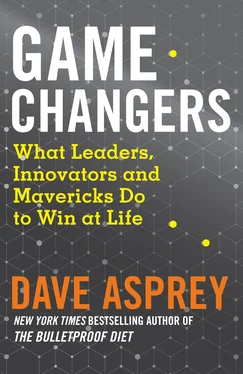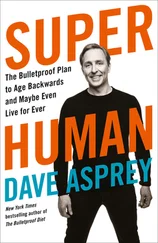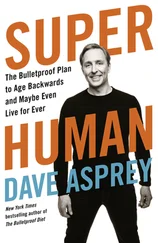1 ...6 7 8 10 11 12 ...15 “Can’t” is always a lie. Learn to see it that way, and you’ll solve problems differently. Go one week without using the word “can’t.” Normally, I would say, “I bet you can’t do it,” but it would be more honest for me to say, “I bet it will be very difficult until you have practiced.”
WEASEL WORD 2: NEED
Parents use the word “need” with kids all the time: “We need to go, so you need to wear a coat.” The truth is, you didn’t need to go, and you didn’t need to wear a coat. Your parents might have wanted to leave, and you would simply have been cold without a coat. By telling your primitive systems that you need something, you end up turning a desire for something into a straight-up survival issue. On a deep level your primitive brain believes that you’ll die if you don’t get the things you say you “need,” even though your conscious brain knows better.
Of course, you probably use this word in all sorts of other ways, too. “I need a snack” or “I need a new coat” are two good examples. You do not need those things, and lying to your brain about what you need is making you weak. The harsh reality is that there are few things you actually need: oxygen every minute, water every five days, and food before you starve after a couple months of hunger. You need shelter, and you need a way to stay warm. The rest are wants, not needs. Be honest by choosing the word “need” only when it is 100 percent truthful; the rest of the time replace it with the truth. You want. You choose. You decide.
This matters even more if you’re in a leadership position. Our systems aren’t good at distinguishing between real and perceived threats. Imagine the panic and bad decisions you can initiate if your team believes at some level that they will die if they don’t do something you suggest they “need” to do. In a physical state of stress, they would be unable to perform and make wise decisions. You can motivate people to run away from something scary, or you can motivate them to run toward something amazing. So instead of telling my team at Bulletproof that we need to hit a deadline, I say, “This is mission critical, and we’re going to do it. What obstacles can I remove for you? What will help us do this?” That truthful language means we can have an honest conversation if we’re really not going to be able to hit the deadline. People who believe the “need” lie will run like maniacs toward a deadline they know isn’t going to happen because that’s what you do when your life is at stake. So stop needing, and start wanting. You’re not going to die.
Challenge yourself to go a week without using the word “need” unless it’s true. You will be tempted to use the word as long as you qualify it, but even in those cases it is unlikely to actually be true. For example, you might say, “We need to leave now if we want to get to the store before it closes.” Even with this qualifier in place, this is still a limited way of thinking. What if you were to simply call the store and asked the people there to stay open a few minutes late? Or simply asked a friend to go? By using the word “need,” you put an unconscious box around the solution set, create subconscious stress, and limit your creativity.
WEASEL WORD 3: BAD
In reality, very few things are inherently “bad”; bad is a value judgment you assign to something. The problem with labeling things as “bad” is that your subconscious listens and prepares you psychologically and biochemically for impending doom. The vast majority of the time, when you say something is bad, you actually mean that you don’t like it or don’t want it. For instance, you might say, “I was planning a picnic, but now it’s raining, and that’s bad.” The truth is that you can have lunch somewhere else, probably without ants. And you’re damned lucky to be able to have lunch at all today. So is it really bad that it’s raining? Nope.
People tend to use the word “bad” a lot in relation to food, which also creates problems. Some foods work better for certain people than others. Those foods aren’t good or bad—and neither are the people who eat them! Even eating something obviously “bad,” such as an MSG-filled vegan pseudoburger, is better than starving to death. The word “bad” creates a false binary. The world doesn’t naturally fall into two camps. Sure, there are things that are truly tragic, such as violence and natural disasters, but when it comes to our everyday lives, judging things through a filter of either good or bad is limiting and creates unnecessary obstacles and black-and-white thinking. When you label something “bad,” you miss out on an opportunity to figure out how it can be good.
WEASEL WORD 4: TRY
“Try” always presupposes a likelihood of failure. Think about it. If someone says he’s going to try to pick you up at the airport when you land, are you going to count on him to do it? No way. You know that there is a good chance he won’t show up. However, if someone says he is going to pick you up, you can believe it. If you tell yourself that you’re going to try to stay on a diet or try to read a book, you’ve subconsciously already planned to fail. You won’t do it.
Jack illustrates the power of “try” during his powerful keynote presentations when he asks audience members to put something (a notebook, a pen, or whatever else they have handy) on their laps and lift it up. After they do it and put it back down, he says, “Now this time just try to pick it up.” That confuses everyone, and they don’t move for a moment. Then a few people start to pick up the item, but suddenly they’re struggling with the same item they lifted effortlessly a moment ago, as if it had gained several pounds. This is because as soon as you hear the word “try,” you assume that whatever you are going to “try” to do might not be possible. It gives your brain an out.
The point is that in order to become a better human, you want to push your brain to perform at its full potential instead of giving yourself an excuse to fail. This doesn’t mean that you have to do everything that is asked of you. If you don’t think that something is the best use of your time and mental energy, you can honestly and clearly (and kindly) say no. But if you choose to take something on, commit to it with all your might. As Yoda said, “There is no try. Only do.” Do you think he developed Jedi powers merely by trying? No way, and the point is that neither will you.
Action Items
Ask someone at work and someone at home to call you out when you use weasel words and to fine you a dollar to put into a jar for charity (or the office coffee fund) when you do.
Set your computer’s autocorrect to automatically capitalize or highlight weasel words so you’ll have to change them to more truthful words. It’s amazing how frequent reminders drive behavior change!
Recommended Listening
JJ Virgin, “Fighting for Miracles,” Bulletproof Radio, episode 386
Jack Canfield, “Go Beyond Chicken Soup & Confront Your Fears,” Bulletproof Radio, episode 471
Recommended Reading
JJ Virgin, Miracle Mindset: A Mother, Her Son, and Life’s Hardest Lessons
Jack Canfield with Janet Switzer, The Success Principles: How to Get from Where You Are to Where You Want to Be
2
GET INTO THE HABIT OF GETTING SMARTER
Doctors and other scientists used to believe that we were born with a brain that was either high functioning or not. Either you were inherently wired to be smart, focused, and able to learn easily—or you weren’t. It wasn’t until around the end of the twentieth century that scientists began to understand the concept of neuroplasticity, the brain’s ability to grow new cells and forge new neural connections throughout your life.
Читать дальше







